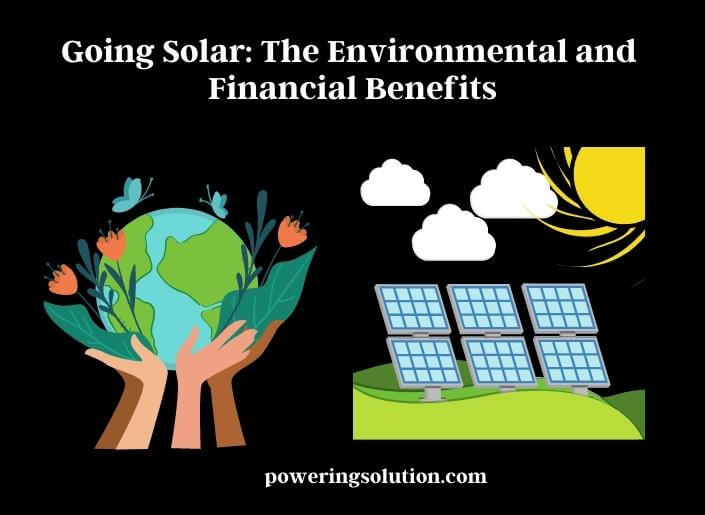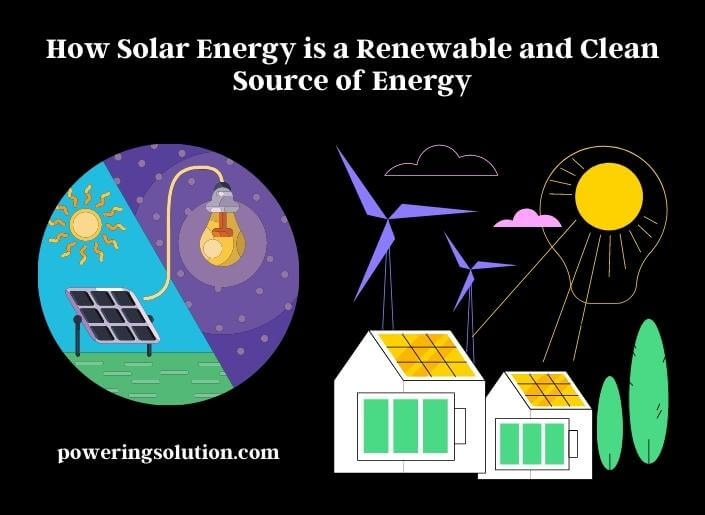As the world becomes more environmentally conscious, many homeowners and businesses are turning to solar energy as a way to reduce their carbon footprint and promote sustainability. Solar energy is a renewable and clean source of energy that harnesses the power of the sun to generate electricity. With the increasing availability and affordability of solar technology, more and more people are choosing to go solar.

The benefits of going solar extend beyond just the environment. In addition to its positive impact on the planet, solar energy can also provide potential financial savings and energy independence. Whether you’re a homeowner or a business owner, going solar can have a significant impact on both your bottom line and the planet.
What are the Environmental Benefits of Solar?
Solar energy offers several environmental benefits. Here are a few key examples:
Renewable and Clean
Solar energy is a renewable and clean source of energy. Unlike fossil fuels such as coal and gas, which are finite resources and produce harmful emissions when burned, solar energy relies on the power of the sun and does not produce any harmful byproducts or emissions.
Reduced Greenhouse Gas Emissions
The use of solar energy can significantly reduce greenhouse gas emissions, which contribute to climate change. According to the National Renewable Energy Laboratory (NREL), solar energy systems can reduce carbon emissions by up to 80% compared to traditional energy sources.
Reduced Air Pollution
Traditional energy sources are a major source of air pollution, which can cause a range of health problems. Solar energy systems do not produce any pollutants, helping to improve air quality and reduce the negative health effects associated with air pollution.
Conservation of Natural Resources
Solar energy does not require the use of any natural resources such as coal, oil, or natural gas, which are finite and have a negative impact on the environment when extracted and processed.
By harnessing the power of the sun, solar energy can help to reduce our reliance on fossil fuels and promote a cleaner, more sustainable future.
How Solar Energy is a Renewable and Clean Source of Energy?
Solar energy is a renewable and clean source of energy because it relies on the power of the sun to generate electricity. The sun is a natural, constant, and abundant source of energy, meaning that it can be harnessed to generate electricity for as long as the sun exists.

Unlike traditional energy sources such as coal, oil, and natural gas, which are finite resources that will eventually run out, solar energy is a sustainable source of energy that will never be depleted. The process of extracting and burning fossil fuels can produce harmful emissions and pollutants, contributing to air and water pollution and climate change.
Solar energy systems do not produce any emissions or pollutants during the generation of electricity. The photovoltaic (PV) cells that make up solar panels convert sunlight directly into electricity without any byproducts, making solar energy a clean and environmentally-friendly option for generating electricity.
By relying on solar energy, we can reduce our reliance on finite and polluting sources of energy and move towards a more sustainable and renewable future.
Financial Benefits of Solar
There are several financial benefits to going solar:
Reduced Energy Bills
Solar energy can significantly reduce your monthly energy bills. Once installed, solar panels generate electricity that can be used to power your home or business, reducing the amount of energy you need to purchase from your utility company. Depending on your energy usage and the size of your solar system, you could potentially eliminate your monthly energy bills altogether.
Increased Savings Over Time
While the initial cost of installing solar panels can be high, the long-term savings can be significant. Solar panels have a lifespan of 25-30 years and require minimal maintenance, making them a long-term investment in your energy savings. Over time, the savings from reduced energy bills can offset the initial cost of installation, providing a significant return on investment.
Tax Credits and Rebates
In many areas, there are tax credits and rebates available to homeowners and businesses that install solar energy systems. These incentives can help to offset the initial cost of installation and make solar energy a more affordable option.
Increased Home Value
Homes with solar panels installed have been shown to have higher resale values than homes without solar. A study by the National Renewable Energy Laboratory found that homes with solar panels installed sold for up to 17% more than homes without solar. This can provide a significant return on investment for homeowners.
Energy Independence
By generating your own electricity through solar energy, you can become less reliant on your utility company and reduce your exposure to rising energy costs. This can provide greater stability and predictability in your energy expenses over time.
While the initial cost of installation can be high, the long-term savings and potential incentives make solar energy a smart financial investment.
Discuss Additional Benefits of Solar
In addition to the environmental and financial benefits, there are several other advantages to going solar:
Energy Security
By generating your own electricity through solar energy, you can become less reliant on traditional energy sources and reduce your exposure to energy price fluctuations and supply disruptions. This can provide greater stability and security for your energy needs.
Job Creation
The solar industry has been growing rapidly in recent years, creating new job opportunities in the manufacturing, installation, and maintenance of solar energy systems. This can provide economic benefits for local communities and contribute to overall job growth.
Improved Grid Resilience
Distributed solar energy systems, which generate electricity at or near the point of use, can help to improve grid resilience and reduce the risk of power outages during extreme weather events or other emergencies.
Educational Opportunities
Installing a solar energy system can provide opportunities for educational outreach and community engagement. Solar panels can be used as teaching tools to help educate children and adults about renewable energy and sustainability.
Corporate Social Responsibility
For businesses, going solar can be an important part of their corporate social responsibility efforts. By reducing their carbon footprint and promoting sustainable practices, businesses can improve their reputation and strengthen their relationships with customers, employees, and stakeholders.
Explanation About Government Incentives of Solar
Many governments around the world offer incentives for individuals and businesses to install solar energy systems. These incentives can help to offset the upfront costs of installation and make solar energy a more affordable option. Some of the most common government incentives for solar include:
Tax Credits:
Many governments offer tax credits to individuals and businesses that install solar energy systems. These credits can help to reduce the overall cost of installation and make solar energy more accessible to a wider range of people.
Rebates:
In some areas, governments offer rebates to individuals and businesses that install solar energy systems. These rebates can provide a cash incentive for going solar and help to offset the upfront costs of installation.
Net Metering:
Net metering is a policy that allows homeowners and businesses to earn credits for excess solar energy that they generate and feed back into the grid. These credits can then be used to offset the cost of electricity that is purchased from the grid when solar energy is not being generated.
Renewable Portfolio Standards (RPS):
Some governments have implemented RPS policies, which require a certain percentage of electricity to come from renewable sources such as solar. This can provide a long-term incentive for the adoption of solar energy and help drive investment in the industry.
Grants:
In some cases, governments offer grants to individuals and businesses that install solar energy systems. These grants can help to cover a portion of the upfront costs of installation and make solar energy more accessible to a wider range of people.
Considerations Before Going Solar
Before making the decision to go solar, there are several considerations that individuals and businesses should take into account. These include:
Upfront Costs
Installing a solar energy system can require a significant upfront investment, which can be a barrier for some people. It’s important to consider the cost of installation, as well as any financing options or government incentives that may be available.
Location
The amount of sunlight that a location receives can impact the effectiveness of a solar energy system. It’s important to assess the solar potential of a location and determine whether it’s a suitable candidate for a solar energy system.
Energy Needs
The size of a solar energy system will depend on the energy needs of the individual or business. It’s important to consider the amount of electricity that is needed, as well as any future growth in energy needs.
Maintenance
Solar energy systems require regular maintenance and cleaning in order to operate at peak efficiency. It’s important to consider the ongoing maintenance costs and factor them into the decision to go solar.
Roof Condition
Solar panels are typically installed on a roof, so it’s important to consider the condition of the roof before installing a solar energy system. If the roof is old or in need of repairs, it may be necessary to replace it before installing solar panels.
Regulations
Local regulations can impact the installation of solar energy systems, so it’s important to research any zoning laws or building codes that may apply.
Energy Efficiency
Before installing a solar energy system, it’s important to maximize energy efficiency by implementing measures such as insulation, weatherization, and energy-efficient appliances. This can help to reduce the overall energy needs and make a solar energy system more effective.
Taking these considerations into account, individuals and businesses can make an informed decision about whether to go solar and ensure that they are getting the maximum benefits from their investment.
Verdict
Going solar can provide a range of environmental and financial benefits for individuals and businesses. Solar energy is a renewable and clean source of energy that can help to reduce greenhouse gas emissions and mitigate the impacts of climate change. It can also provide long-term financial benefits by reducing electricity bills and providing a hedge against future energy price increases. Additionally, there are several government incentives and other benefits that can help to offset the upfront costs of installation and make solar energy more accessible and affordable.
Before making the decision to go solar, it’s important to consider several factors such as the upfront costs, location, energy needs, maintenance, roof condition, regulations, and energy efficiency. By carefully weighing these considerations, individuals and businesses can make an informed decision about whether solar energy is the right choice for them.
Going solar can provide significant benefits for both individuals and the environment. By adopting solar energy, we can help to build a more sustainable and resilient energy system that supports a cleaner, healthier, and more prosperous future for all.
It’s important to know the dark side of solar energy, see here to know the answer.
